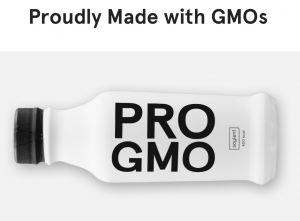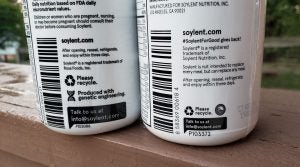Few food companies over the past decade have voluntarily promoted the use of genetic engineering on their labels. After all, organizations such as the Non-GMO Project have profited heavily by demonizing the use of biotechnology in agriculture and food. But one company that stood above the fray and celebrated this sustainable science was Soylent.
The California-based company specializes in ready-to-drink meals that are built around soy protein — a 14-ounce bottle clocks in at about 400 calories and is available in a wide variety of flavors, from vanilla and strawberry to chocolate mint and cafe mocha. I’ve been a customer for several years, drawn not only by the taste and convenience of their product but also by the fact that Soylent had long proudly marketed a pro-GMO stance and emblazoned their bottles with a “Produced with genetic engineering” statement.

That means a lot to someone like me who sees the adoption of science and sustainable technologies vital to advancing our food system, to overhauling our use of crop inputs, and to increasing efficiencies along the food chain. The use of genetic engineering in food is a viable and exciting way forward for our industry — and reckless opponents of this science like the Non-GMO Project should be damned.
So, it’s been with some concern that my last several shipments of Soylent drinks have come in new packaging that has removed the previous mention of genetic engineering. The pro-GMO approach had been instrumental to their marketing, and it wasn’t long ago that then-CEO Bryan Crowley observed that the public was becoming more accepting of genetic engineering, and that the “the pendulum is swinging in favor of the science.”
But to look at Soylent now, under CEO Demir Vangelov, all mentions of “genetic engineering” or “GMOs” have been scrubbed from their website — the company’s blog post that was titled “Proudly Made With GMOs” has been taken down, as has the Soylent Help Center page titled “Why is Soylent made with GMOs.”
Some new packaging incorporates the U.S. Food and Drug Administration’s bioengineered logo, albeit it’s so small as to be virtually unreadable (especially the actual “bioengineered” wording on the logo). Yet that step feels forced in comparison to the wording they’ve voluntarily had on their products in the past. And, unfortunately, Soylent hasn’t used the FDA’s logo on all of its varieties this year.
The company still claims to be leading the charge in innovation, but their actions regarding biotechnology don’t bear that out.

Communities have been taking notice of this unfortunate labeling change, too. A Reddit thread from early 2021 pointed out the removal of the wording, with most of the more than 100 comments lamenting the decision and criticizing Soylent.
One poster emphatically said: “Give me my GMOs!/You know who’s against GMOs? Anti-vaxers, flat-earthers, qannon crackheads, and anti-science idiots.”
Other comments further show support for science, such as: “GMO is class though, it’s literally super food,” and “GMO foods are good stuff, they’ve removed carcinogens from potatoes. Made crops more resilient to different climates. They use less pesticide, drought resistant.”
The overarching feeling from the Reddit thread is that Soylent is wilting away from sound science and dumbing down their approach in order to make a profit — even if the company still uses genetically engineered soybeans without disclosing it as prominently.
I reached out to Soylent multiple times through social media and their website, as well as via their marketing department, to get an explanation or more insight into what was going on, but like on the company’s platforms, GMOs seem to be a topic that no one there is willing to discuss.
This should be a concern. Generation Z (those born in the mid-to-late ’90s) has shown itself to be more open to food technologies than any other generation, which gives this up-and-coming consumer base a lot of power in the food market moving forward. Additionally, many measures show that the fear and opposition to GMOs have been waning, and public sentiment has moved on to topics such as lab-grown meat and farming’s role in the climate debate.
That makes the timing of Soylent’s shift all that much more perplexing. Soylent weathered the worst of the social storm around GMOs through the 2010s, yet now, they’re actively regressing the gains and acceptance that had emerged.
After all, even Crowley, the former CEO, said that it’s not about being pro-GMO, it’s about being pro-science.
And when companies such as General Mills or youth organizations such as the Girl Scouts can embrace biotechnology as the most viable path forward for a growing population, it’s particularly stinging that Soylent shies from its roots and fecklessly gives fresh ammunition to opponents of food tech.
Ryan Tipps is the founder and managing editor of AGDAILY. He has covered farming since 2011, and his writing has been honored by state- and national-level agricultural organizations.



